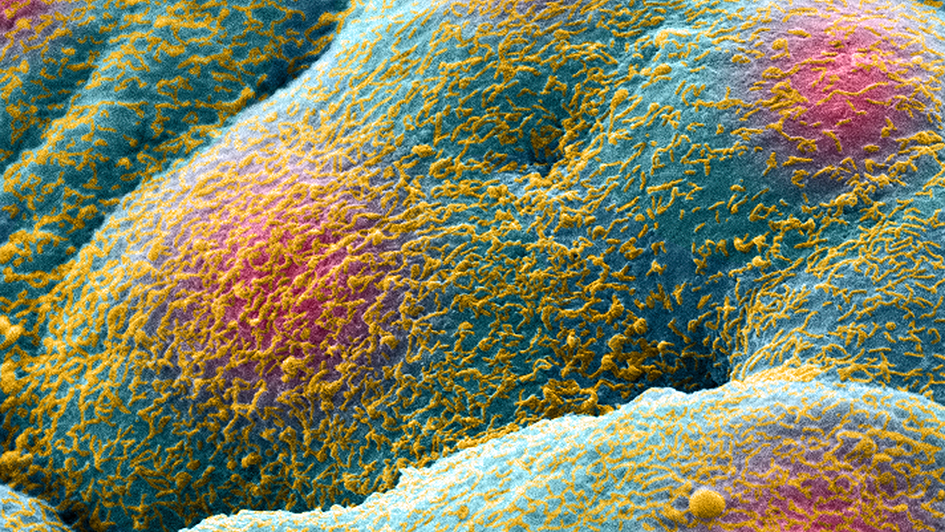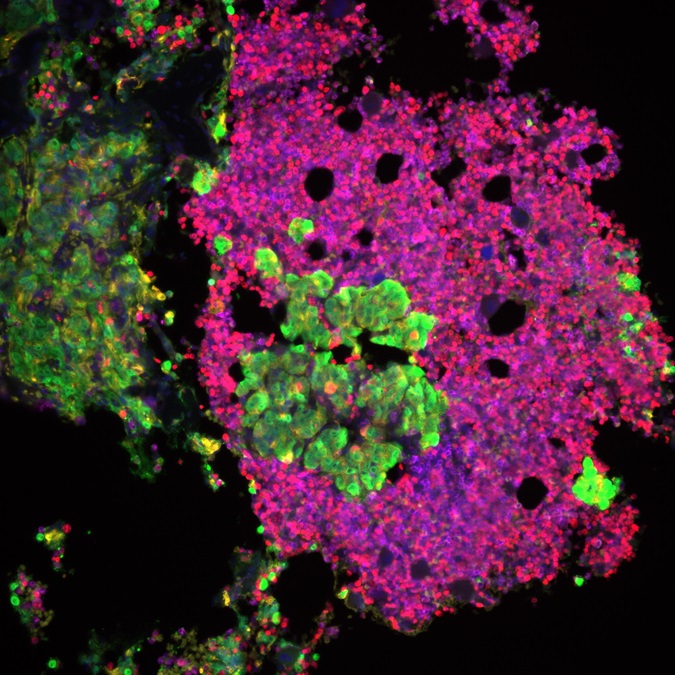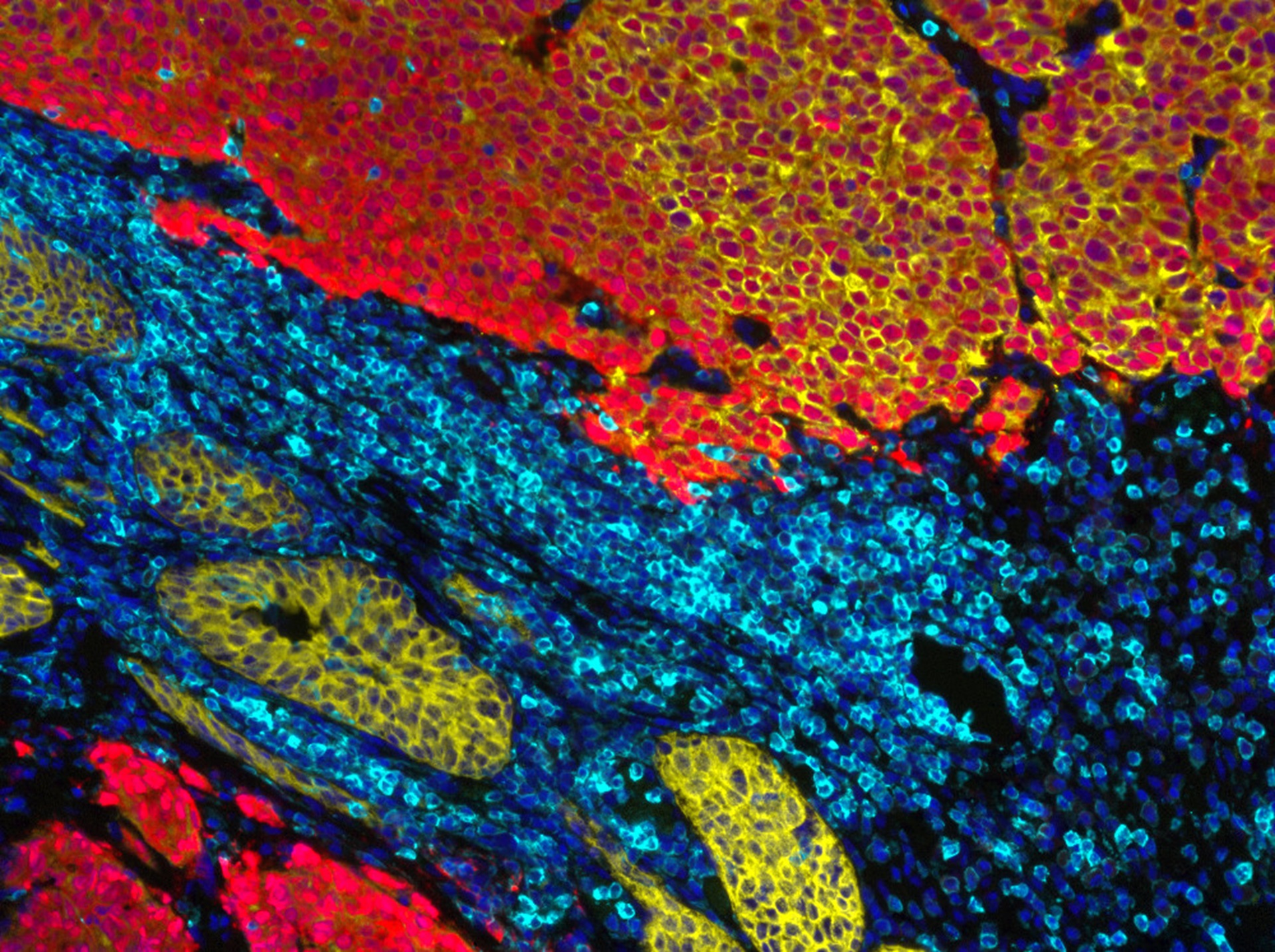Our research into prostate cancer
In recent decades, remarkable advances in diagnosis and treatment – driven by research – have dramatically improved prostate cancer survival rates. When detected early, the disease can often be treated successfully. Today, 8 out of 10 men in the UK will live at least ten years after diagnosis.
Our groundbreaking work is helping men with prostate cancer live longer. Our scientists discovered the drug abiraterone – now a mainstay treatment for advanced prostate cancer worldwide, identified genetic variants that influence risk of developing the disease, and pioneered new, more precise forms of radiotherapy.
Transforming diagnosis
At The Institute of Cancer Research, London, our scientists are leading the development of a simple spit test, where a sample can be collected at home, for identifying prostate cancer risk. Our research has shown that this method is more accurate at identifying future risk of prostate cancer for some men than the current standard PSA blood test,
The saliva test is now being assessed in a larger clinical trial and our researchers estimate that it could identify more than 12,000 people earlier, saving the NHS around £500 million a year. Professor Ros Eeles, Professor of Oncogenetics at The Institute of Cancer Research, London, said this groundbreaking development can “turn the tide on prostate cancer”.
Genetic testing
Professor Ros Eeles analyses the DNA of men with and without prostate cancer to try to find genetic clues about the disease. Her team has found more than three-quarters of known genetic variants that increase a man’s risk of prostate cancer.
These differences in DNA give researchers clues about the disease’s biology that could lead to new treatments, as well as helping identify who has a genetic predisposition to prostate cancer.
.tmb-ctadt.jpg?Culture=en&sfvrsn=ebe66b89_1)
"I was so lucky that my cancer was picked up at a very early stage."
“I was young and fit, with no symptoms. For my father, it was a different story. His experience, and mine, showed me the importance of early diagnosis.” - Godfrey Fletcher
Latest prostate cancer discoveries

Legendary jockey Bob Champion awarded honorary doctorate at ICR graduation ceremony

Men with BRCA1 and BRCA2 gene mutations should get annual prostate cancer screening
Godfrey Fletcher found out he had prostate cancer in 2015 at the age of 47, shortly after his father had also been diagnosed. Godfrey had radiotherapy and surgery, and a year after he finished treatment, he was told it had been successful. His father was diagnosed at a later stage. Surgery was no longer an option, and treatment was limited. Godfrey’s father sadly passed away after his cancer spread.
"We need more options for diagnosing and treating prostate cancer. More people should support research into the disease as it will save lives. I welcome any scientific advances that will take the fear away and give people hope."
Developing the best prostate cancer treatment options
Targeted therapies
Precision medicine gives patients the best treatments according to the genetic profile of their cancer. Targeted drugs like olaparib, currently used to treat ovarian, breast and pancreatic cancers, are now being used to treat more men with prostate cancer.
Trials led by Professor Johann de Bono have shown that olaparib can work for men whose tumours have mutations in specific genes. New research from his team is now looking at how long patients will respond to olaparib through a simple blood test.
Our research is unravelling the causes of prostate cancer, understanding the key indicators in genetic variation and creating personalised treatments for patients.

"When I was diagnosed, I didn’t think that I would still be alive after 13 years."
"Thanks to abiraterone I have been well enough to travel abroad as much as I want to, see my grandchildren grow and go to my daughter’s wedding in Germany. Not a bad life for someone with advanced prostate cancer!" - Rob Lester
Abiraterone
We discovered the drug abiraterone (Zytiga), the first treatment shown to be effective in men with advanced prostate cancer. Now, abiraterone is a standard treatment after chemotherapy, extending the lives of thousands of men with advanced prostate cancer across the world.
Working with our partner hospital The Royal Marsden NHS Foundation Trust, we ran clinical trials to establish its effectiveness, both post-chemotherapy and earlier during treatment. Professor Nick James led the ground-breaking STAMPEDE trial, which showed that offering abiraterone earlier can boost survival.

New drug can slow prostate cancer growth
Laboratory studies co-led by Dr Adam Sharp and Professor Johann de Bono showed that NPX800 – a new drug, discovered at the ICR, which targets a ‘master switch’ that cancer cells hijack to support their growth – slowed prostate cancer cell growth.

Radiotherapy
We are a pioneer in developing new forms of radiotherapy for prostate cancer treatment. An example of our success in radiotherapy research is the CHHiP trial , which showed that fewer, larger doses of radiotherapy were just as effective as the standard regime.
This led to changes in clinical guidance, which mean patients have fewer treatments and hospital appointments, while reducing the rate of potentially life-changing side-effects.

Clinical trials
Professor Johann de Bono and Professor Nick James are leading clinical trials of new prostate cancer treatments.
Our researchers, through our joint Drug Development Unit with The Royal Marsden, have also played leading roles in trials of enzalutamide (Xtandi) and radium-223 (Xofigo), as well as in ongoing trials of other experimental prostate cancer drugs.

Need information on symptoms and support?
At the The Institute of Cancer Research, London, we are dedicated to defeating cancer through research. We are world leaders in identifying cancer genes, discovering cancer drugs and developing precision radiotherapy.
If you are concerned that you may be experiencing the symptoms of prostate cancer, please contact your GP. They will also be able to direct you to support services if you have recently been diagnosed and need support. For more information, please visit the NHS website.
Donate to help more men survive prostate cancer
We urgently need better ways to detect prostate cancer earlier, predict drug resistance, and develop smarter, more personalised treatments – giving every man the best chance of survival with a better quality of life.
As a UK charity, our life-saving research relies on the generosity of individuals and organisations. Our supporters help us make a difference to the lives of cancer patients and their families everywhere.
